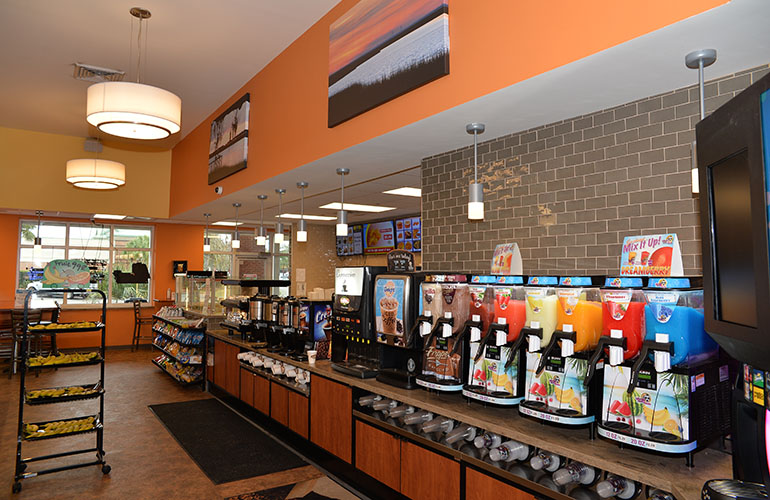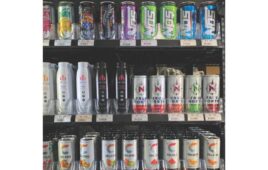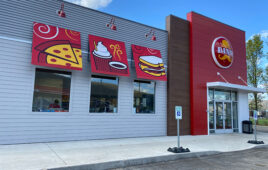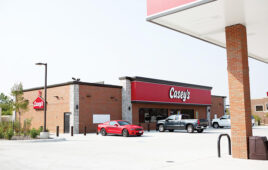 Refuel convenience stores burst into the spotlight this past May when it closed two acquisitions alongside its private equity sponsor, First Reserve, immediately increasing its store count more than sixfold — from five to 33 c-stores — with the acquisitions of Hartsville, S.C.-based West Oil and Bishopville, S.C.-based Bishopville Petroleum.
Refuel convenience stores burst into the spotlight this past May when it closed two acquisitions alongside its private equity sponsor, First Reserve, immediately increasing its store count more than sixfold — from five to 33 c-stores — with the acquisitions of Hartsville, S.C.-based West Oil and Bishopville, S.C.-based Bishopville Petroleum.
The Mt. Pleasant, S.C.-based chain has been pursuing an ambitious growth trajectory ever since that includes reimaging and updating acquired sites to the Refuel brand. Refuel is now investing $50 million in new-to-industry c-stores throughout the Charleston, S.C. market. All the while, it’s thundering aggressively toward its goal of becoming a 100-plus store chain in less than two years through acquisitions and new builds.
As it grows, it’s updating its foodservice offering to include bean-to-cup coffee and Refuel’s proprietary fried chicken program; rolling out a new smartphone app that includes loyalty and mobile payment; and expanding its car wash business.
Paving the Way
Mark Jordan founded and incorporated Refuel Inc. in 2008. Jordan, a c-store veteran, had been developing and operating c-stores dating back to 1999. He’d divested his first c-store business to Cary, N.C.-based The Pantry in 2004, then developed build-to-suit properties for The Pantry in the Charleston market. When his non-compete agreement with The Pantry expired in 2008, he was ready to jump back into the business.
“I missed the c-store business,” Jordan said. “I looked at it and thought, you know, I think I can do this better and better.”

Travis Smith, chief administrative officer, Refuel, and Mark Jordan, CEO, Refuel.
Jordan opened his first Refuel convenience store in the Charleston market in Goose Creek, S.C., including a proprietary fried chicken foodservice program.
Jordan’s time away from the business had given him a chance to reflect.
“I toured many stores that I admired across the country, and I read a lot of annual reports. I started thinking a lot about what Refuel might look like,” he said.
Jordan met Travis Smith, now chief administrative officer and general counsel of Refuel, in early 2016. A lawyer, Smith worked with Corpus Christi, Texas-based Susser Holdings, where he was involved with ground-up development and mergers and acquisitions. The two met following the sale of Susser to Energy Transfer Partners (Sunoco) in 2014.
Jordan and Smith recognized a shared vision and an opportunity to grow the Refuel brand.
“We think the same way,” Smith said. “We like the same kind of things. We decided, look, there’s an opportunity here for a roll-up, acquisition-type deal, and we just started talking about it.”
After due diligence in confirming opportunities in the private equity markets and the viability of their vision, the two formalized their partnership, and Smith resigned from Sunoco in 2016.
Investment bankers, who were assisting Refuel with raising capital, introduced Smith and Jordan to private equity firm First Reserve. In April 2018, Refuel formerly partnered with First Reserve to jointly pursue a strategy to grow via acquisitions in the c-store industry.

Refuel’s business model includes only purchasing locations that fit its protype, meaning top-quality, large and highly trafficked stores “capable of competing into the future.”
It was First Reserve’s first investment in the c-store sector, “but they had evaluated several recent investment opportunities, and
we were aligned on the thesis,” Smith said.
By now, Refuel had grown from a single-store operation to a five-store chain of top-quartile stores and was ready to begin acquiring locations. In late 2018, Refuel set its sights on acquiring West Oil.
“I knew the stores well,” Jordan said. “I knew the reputation of the company, and it was a company we admired so much that we were excited to have the chance to buy them.”
Refuel’s business model includes only purchasing locations that fit its protype, meaning top-quality, large and highly trafficked stores “capable of competing into the future.”
“West Oil was a very well-run company, and we were fortunate to be successful in acquiring them,” Jordan said.
West Oil’s 26 c-stores were situated near Hartsville, S.C., and Florence, S.C., roughly two hours from Charleston off I-95.
“It was quickly apparent that it would be an ideal acquisition to combine with the Refuel assets and formally establish our platform with First Reserve,” Smith said.
On May 1, 2019, First Reserve simultaneously acquired the West Oil assets while rolling legacy Refuel into the newly established Refuel platform. Jordan and Smith noted it was more efficient to line up both acquisitions to close simultaneously, establishing sufficient scale. Importantly, Jordan rolled 100% of his equity into the newly established platform alongside First Reserve, demonstrating his commitment to grow and build the platform that he established in 2008.

With First Reserve, Refuel now has the financial backing to acquire and develop more locations at a much faster rate.
West Oil included the fee simple interest in 25 Markette c-stores and a leasehold interest in one c-store in Hartsville, S.C. The acquisition brought Refuel’s store count to 31.
On the heels of the West Oil acquisition, in June, Refuel closed on the acquisition of Bishopville, S.C.-based Bishopville Petroleum Co. Inc., one of the oldest Shell-branded distributors in the nation. The acquisition included two high-volume c-stores — in Bishopville and in Camden, S.C. — along Interstate 20, adjacent to Refuel’s Hartsville/Florence operating area. The purchase included a wholesale fuel distribution and transportation business.
The acquisition boosted Refuel’s store count to 33.
“The two Bishopville locations are situated within the same regional footprint as the West Oil locations, so this was an easy
decision,” Smith said.
The Bishopville acquisition also provided Refuel with a wholesale distribution platform, allowing it to pursue this second growth area. Green DesChamps, former owner and president of Bishopville Petroleum, joined Refuel as director of its new wholesale fuel distribution division. Refuel is currently supplying fuel to approximately 25 dealers.
Refuel predicts “that a number of tuck-in retail acquisitions will come with a wholesale component,” Smith noted, adding that Refuel’s primary focus will be on company-operated stores.

At its Daniel Island, S.C., site, which opened in the summer of 2016, Refuel implemented all of its most successful programs. The location also features Refuel’s trademarked canopy, one of its most notable attributes.
Upgrading and Improving
At the end of August, Refuel was close to completing the external reimaging of all acquired sites to include the Refuel logo and exterior design, and a rebranding to Exxon fuel. Refuel stores offer either Exxon or Shell-branded fuel.
Currently, Refuel is converting store interiors to fit the Refuel model, remodeling stores where necessary. Already, Refuel has refreshed the fountain drink program at all locations.
The coffee program is receiving a facelift, too.
“We are updating the coffee offering to a bean-to-cup program,” Jordan said. While Refuel doesn’t plan to add square footage to stores, it is evaluating add-ons, specifically when it comes to enhancing foodservice.
“We constantly reinvent ourselves on foodservice and understand more every day about how to be increasingly successful with that,” Jordan said.
As Refuel refreshes acquired locations, it’s also investing in critical infrastructure.
At press time, the chain was entrenched in EMV (Europay, Mastercard and Visa)-compliance upgrades company-wide ahead of the October 2020 deadline. On the technology front, Refuel implemented scanning at all Markette locations on “day one” of the acquisition.
“That alone allowed us to do typical two-for pricing and things that have become commonplace in the industry that Markette wasn’t doing, so we rolled that out with great success immediately,” Jordan said. “Based on our volume throughput from various vendors, you can already see the benefit.

Refuel works to make its locations inviting for customers. At the Daniel Island location, it’s not unusual to see a handful of kids’ bikes outside or children snacking on the front porch, which features TVs and a fireplace.
“We’re changing a little bit about the way they operate, and a little bit about what the stores sell,” Jordan added. “As far as adding departments, Markette did some really unique things that were wildly successful.”
Promoting lottery is one such success. Markette and Refuel were usually “neck and neck” for top lottery sales per store in South Carolina, “which is a hard thing to do,” Jordan added.
“We basically bought a chain that thinks a lot like we do,” Jordan said. “We love to do a lot of volume, and we like to do things right. The things we are changing, we are certain we want to change, but there’s so much we didn’t even have to touch.”
Taking Flight
This July, Refuel announced a $50 million investment plan to expand its footprint in Charleston and eastern South Carolina, through the construction of 10 new-to-industry c-stores in the next year.
In August, it welcomed a new chief financial officer, Jon Rier, who served with Atlanta-based RaceTrac Petroleum for the past 12 years.
Refuel has set its sights on ramping up its fleet of stores to more than 100 sites in less than two years through a combination of acquisitions and new builds.
South Carolina appeals for a range of reasons. South Carolina is a hot destination in the U.S., Jordan said, with new residents arriving in droves. “Major companies such as BMW, Volvo, Boeing and high-tech companies are bringing jobs to the market,” Jordan noted. The Charleston market, in particular, is one of the fastest-growing areas in the state.
Construction is already underway on two new sites — one in Sumter, S.C., and one in Nexton, S.C. — both set to open in the fourth quarter of 2019.
“We currently have six sites under control in the Charleston market and two sites under control up I-95,” Smith said.
The new stores in the Charleston market will look similar to legacy Refuel stores, including porches and family-friendly touches, and will measure between 4,500-6,500 square feet, depending on location.
The new builds are expected to cost about $5 million each and are set to feature Refuel’s proprietary fried chicken program and pizza offerings, which are made fresh in the stores.

Refuel looks to ramp up its fleet of stores to more than 100 sites in two years through a combination of acquisitions and new builds. The new builds are expected to cost about $5 million each, and are set to feature Refuel’s proprietary fried chicken program and pizza offerings, which are made fresh in-store.
While Refuel has always had a foodservice component, what’s changed is that its offering is now data-driven.
“We figured out what customers want to buy based on better numbers, and we try to put those items out there looking as good as possible, and in appropriate amounts,” Jordan said.
Refuel has perfected the southern delicacy, boiled peanuts. “To my knowledge, we are the only chain actually doing this on-site,” Jordan said. “We make them fresh in all of our legacy stores, and they will be in all new builds in the South.”
The food programs are branded Refuel. “If you go inside the store and buy a bag of boiled peanuts or a slice of pizza, it’s got our logo on it,” Jordan said. “It’s got a barcode that we produce on it. …”
“With the Bishopville acquisition, both those retail sites leased space to fast food, so we have a McDonald’s tenant and Kentucky Fried Chicken tenant,” Smith said, but Refuel doesn’t operate the businesses.
Refuel is also continuing to grow its Refuel Rewards loyalty program, which offers customers a 10-cent discount for using the Refuel debit card. It’s currently developing an app — that will incorporate the loyalty program and mobile payment capabilities — which is expected to launch by the end of the year.
Car washes encompass another key department. The chain operates four car washes and is rolling out additional car washes at two existing locations, and on one of the new stores currently under construction — bringing Refuel to a grand total of seven car washes by the end of 2019. All of the car washes are single-bay, automatic washes operated under the Refuel brand.

Refuel is converting store interiors to fit the chain’s prototype, remodeling where necessary. Already, Refuel has refreshed the fountain drink program at all locations. The coffee program is receiving a facelift, too, including bean-to-cup coffee dispensers.
“We have by far the most successful car washes that I’ve ever seen in their class,” Jordan said. He credits both location and the dedication to ensuring the car washes are in top shape. “We spend a lot of money on maintenance, and we don’t skimp on anything. Customers reward us for that.”
The car washes offer an RFID- (radio-frequency identification) tag car wash club. “We do more volume on our car wash club than a lot of people’s car washes do in total,” Jordan said.
Crème de la Crème
“The new builds are really exciting to me,” said Jordan. As the Refuel brand has grown, Jordan has had the opportunity to evaluate what works best, what needs improvement and experiment with new options.
At its most recent Daniel Island, S.C., site, which opened in summer 2016, Refuel implemented all of its most successful programs. The site features Refuel’s trademarked canopy, one of its most notable features.
“We don’t just sell f’real milkshakes, we sell hundreds of them a day,” Jordan said. “It’s a family-friendly place for kids to hang out after school. It’s comfortable. We have wine-tastings there. It screams, ‘This is a place to spend some time,’ and we enjoy that.”
Jordan aspires to design stores that are comfortable gathering places for patrons. “We love architecture. We like the idea of place-making and making a convenience store look like it’s run by just regular people, not big companies,” he said. As a result, the stores are built to look different in order to fit each location.
“Refuel, it’s probably the most family-friendly convenience store I’ve ever been to,” Smith said. At the Daniel Island store, for example, it’s not unusual to see a handful of kids’ bikes outside, and kids snacking on the front porch, which features a fireplace.
“It’s a place that is inviting to people. I think Refuel is unique in that regard. Convenience stores get a bad rap, and we don’t have that one,” Smith said.
The Daniel Island store has thrown parties that have drawn hundreds of customers.
“When you, as a gas station, can become a part of the community in a really positive way, and people take ownership of the store, it’s a really proud moment,” Jordan said. “We intend to do that every time we build a store because it’s more fun, it pays better dividends to us as a company, and it’s just what we’re going to do.”




